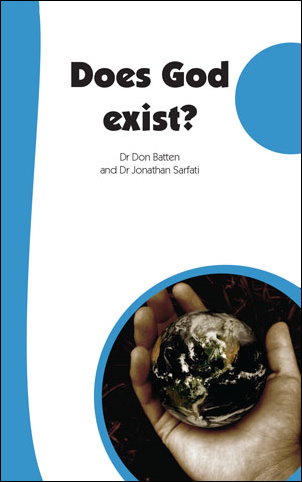Feedback archive → Feedback 2012
Time, eternity, and the creation of the universe

Jason D., from the USA, a doctoral student in ‘biblical studies’ at Harvard, commented on the article Who created God? The article argues that from the principle of causation (anything that begins to exist needs a sufficient cause), the universe must have been caused (created) by an entity with the attributes of God as described in the Bible. Jason’s series of comments and responses from Dr Don Batten illustrate some important points, not the least of which is how corrupt the theological teaching is at one of America’s biggest name universities.
Jason D.:
The question is not what caused the universe. The question is what caused Causality? Nothing can “intentionally act”, unless absolute temporarily is in place. “Existence” itself requires time. Your god cannot have created the structues in Reality “necessary” for its own existence. You have nether answered the question, nor even asked the right questions.
Don Batten:
This is answered here: Does the universe need a cause? Note particularly the part about simultaneous causation.
Your assertion that existence itself requires time assumes a material existence and the argument is that something had to be non-material (supernatural) and therefore capable of being eternal or timeless that brought the universe into existence.
Jason D. responds:
This is just proximate cause. An omnipotent god could have created a universe maker.
Don Batten:
That might be so but it does not change the thrust of the argument one iota, that there must ultimately have been a non-created, eternal and very powerful/intelligent cause for the universe.
The Bible tells us that Jesus the Messiah was the agent of creation (Colossians 1:16). But then it also makes it clear that He was ‘God in the flesh’ and indeed the eternal Son of God with the Father and Holy Spirit, so He was not created. See: a biblical defence of the trinity.
Jason D. responds:
The very idea of “intelligent designer”, and “creator” all involve *action* verbs. Action require time. One cannot use an “action” verb in the context of an environment in which time does not already exist. It’s linguistically meaningless.
BTW, posting Bible quotes to support an argument is circular. The Bible was written by believer about what they already believed to remind themselves what they already believed. The Bible does not “tell” us anything, except what the believers already believed. Either language has linguistic integrity, or it doesn’t. Action verbs “before” time are meaningless.
Don Batten:
I have already answered you about time and causation, above, by the principle of simultaneous causation, which is not a new idea, known to philosophers for hundreds of years. Your objections are nothing new and have been answered (see the explanation under “Is creation by God rational?”) This might also be helpful: Infinity through dark glasses.
As for using the Bible being circular, see: Are biblical creationists guilty of circular reasoning?
Your view of the Bible merely being the writings of believers telling us what they believed suggests that you have never read the Bible. The Bible is largely a book of history; records of events in space and time. The theology connects with the historical events (such as the Resurrection). Archaeology confirms many of the historical events (where evidence has been found). When skeptics have attacked the Bible it has had a track record of later being proved correct. See Archaeology Q&A.
Jason D. responds:
You may have *attempted* an answer but it is no answer. For the wor *causality* to have linguistic integrity, the INTENTION MUST precede the act. The nonsense of “simultaneity by philosophers is nonsense . It has never been observed, and you know it. “Infinity through dark glasses” is just meaningless.
As for my not having read the Bible, that’s preposterous. I am a PhD Biblical DStusies student at Harvard, and I knkow more about it than you do. Whatever it is, the Bible is NOT a book of history. In archaic Hebrew there is not even a wrod for “history”. It’s “literature”, not “history”. It’s a compilation of various forms of “literature”. As Dr. BB Scott from the Tulsa seminary says, in “The Problem with Resurrection”, it has NOTHING to do with “history”. The modern American Fundamentalist literalism is WAY off the rails, secondary to ignorance, and a lack of real education. Archaeology confirms some events, and also, in many cases confirms that the so-called historical events could not have happened the way they were presented in the Bible. For example camels were not domesticated until 1000 BCE. Do you get wht that means for ALL the dating in the Old Testament ? We also know that the Torah of Moses was written during the Exile, when they conbined J, E, P, and the Babylonian myths. All og Genesis 1 is myth, taken directly from Babylonian/Sumerian myth. Scholars don’t even debate that any more. Where did you get your education ?
Don Batten:
So, you don’t like the answer that specialists in philosophy find satisfying (simultaneous causation)? You apparently don’t like your ‘gotcha’ objection being answered. That is, you are not looking for answers, but looking to justify an anti-Christian worldview. Yes, I know you are a theology student, but you are anti-Christian because you do not believe what Jesus the Christ said about the real history of events in Genesis—the creation of Adam and Eve and the Flood (Luke 17) for example. Furthermore, you don’t believe God the Father either, because Jesus only spoke what the Father told him to say (John 12:44–50). So, you stand opposed to God, which is a rather dangerous thing to do.
If you have read the Bible as you claim, then you have no excuse for your unbelief; none whatever. That makes your situation even direr.
And because you are a biblical studies student at Harvard you know more about the Bible than I do? I don’t see how being a student at Harvard (or anywhere) shows that you know more about anything than someone else. The logic escapes me. The most important thing I learned when I was a PhD student was that I didn’t know much! It should be a humbling experience. But let’s look at some of your claims and see how much you have learned at Harvard that is actually true or defensible.
You say, “Whatever it is, the Bible is NOT a book of history.” So, you don’t know what it is, but it’s not history? You say that it’s “‘literature’, not ‘history’”? What type of literature? Of course the Bible is not just a book of history, but its overarching framework is a claim about history; the history of the universe from the beginning to the end. Genesis in particular is meant to be understood as history, as the Oxford University Hebrew Professor James Barr stated. See Should Genesis be taken literally?
You claim that biblical Hebrew has no word for ‘history’, as if this proves they did not know what history was (another non sequitur). They had no actual word for universe either, but clearly understood the concept, coupling ‘heaven’ and ‘earth’ together (e.g. Genesis 1:1) to convey the concept (a construction known to grammarians as a merism). But according to Edward Robinson’s translation of a complete index to Gesenius’ Hebrew Lexicon, published in 1877, the Hebrew word for history is toledot, usually translated as ‘generations’ (e.g. Genesis 2:4, 5:1, 10:1, etc.).
Since there are many archaeological confirmations of the events recorded in the Bible, if the Bible is not about history in these areas, then neither is archaeology, which would be rather bizarre! You even admit that archaeology confirms events in the Bible, then claim the Bible is not about history. That does not seem at all logical.
Yes, I know that you are a theology student at Harvard, but have you ever actually read Kings or Chronicles? Often theology students read more works about the Bible rather than the Bible itself. I fail to see how you could read these and not see the historical nature of this ‘literature’.
And there is plenty of evidence that the Resurrection of Jesus happened in time and space (i.e., real history). And if the Resurrection did not actually occur, there is no point to Christianity and I don’t know why you are bothering to even study theology; what a waste of time! See The Resurrection of Jesus and the related reading. Many a skeptic has set out to disprove the historicity (reality) of the Resurrection and ended up convinced it happened and converted to be a follower of Jesus Christ (e.g., lawyer Frank Morison, who wrote Who Moved the Stone?).

You claim “modern American Fundamentalist literalism is WAY off the rails, secondary to ignorance, and a lack of real education.” Wow! Firstly I am not an American. Secondly, this ‘literalism’ as you call it, is nothing more or less than the view of Bible scholars for 1850 years before the modern era of so-called ‘liberal’ theology, which is nothing more than the same lie that the serpent said to Eve in the beginning, “Did God really say?”. “American Fundamentalism”, as you label it, was kicked off by the publication of The Fundamentals in 12 volumes, in 1909, written by various prominent Christian scholars. This was a detailed re-affirmation of historic Christianity, necessitated by the rise of the new kid on the block, 19th century liberalism, originating with the ‘higher critics’ in Germany. It is liberalism that is the modern invention, not ‘fundamentalism’.
You claim that archaeology disproves some historical claims of the Bible. I could ask how archaeology could do that unless the Bible was about history. As your (best?) example you offer the domestication of camels being supposedly much later than the Bible claims. However, this is a very old claim that has long since been shown to be wrong; see the short article about camels on About.com, which puts their domestication a long time before Moses.
And then you claim, “We also know that the Torah of Moses was written during the Exile, when they conbined J, E, P, and the Babylonian myths.”
I do wonder how you would ‘know’ this when there is not a skerrick of evidence for the existence of these supposed scribes at the time of Ezra, a thousand years after Moses! This 19th century idea has also long since been discredited. The JEDP idea (documentary hypothesis) absolutely disregards the large-scale structures in Genesis that we simply wouldn’t see if it was simply cobbled together—the genuine indications of prior sources fit very well with Moses acting as a sort of editor with pre-existing sources. Indeed there are large-scale structures in the text that show it had one author/redactor. And Genesis 1 couldn’t have been taken directly from Babylonian or Sumerian myth—did you miss the distinctive Jewish monotheism and thinly-veiled polemic against sun and star worship? Even scholars of a liberal bent have debunked the documentary hypothesis. See also, Did Moses really write Genesis?
Might I suggest that you broaden your studies to include the work of some of today’s best evangelical scholars, such as D.A. Carson, Grant Osborne, and Douglas Moo, among others? If what you have written here is any indication, you are not being trained to think at Harvard, but just to parrot the rather out-dated ideas of your liberal professors.





Readers’ comments
Comments are automatically closed 14 days after publication.